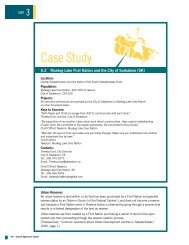The State of Canada's Cities and Communities 2012 - FCM
The State of Canada's Cities and Communities 2012 - FCM
The State of Canada's Cities and Communities 2012 - FCM
Create successful ePaper yourself
Turn your PDF publications into a flip-book with our unique Google optimized e-Paper software.
Chapter 4<br />
Page 4<br />
Front-line community police are also seeing<br />
frustrating trends, as challenges within Canada’s<br />
mental health system begin to play out on our<br />
streets. A 2010 Vancouver Police Department<br />
report, Policing Vancouver’s Mentally Ill: Beyond<br />
the Disturbing Truth, suggests that, because <strong>of</strong><br />
shortfalls in Canada’s health care system, “the<br />
police have become society’s 24/7 de facto<br />
front-line mental health workers.” 7 <strong>The</strong> Vancouver<br />
Police Department is working with Vancouver<br />
Coastal Health to address the overwhelming<br />
proportion <strong>of</strong> police resources dedicated to<br />
responding to mental health <strong>and</strong> addiction<br />
problems within the community. Other jurisdictions<br />
across Canada have added or increased<br />
training related to policing <strong>and</strong> mental health.<br />
To address violence <strong>and</strong> crime in our communities,<br />
we have to prevent crime through social<br />
development—by providing the requisite social<br />
infrastructure, for example—<strong>and</strong> address the root<br />
causes <strong>of</strong> crime, which involves complex social,<br />
economic <strong>and</strong> cultural factors.<br />
3. Restoring Accountability<br />
Municipal property taxpayers pay hundreds <strong>of</strong><br />
millions <strong>of</strong> dollars a year to purchase front-line<br />
policing services from the RCMP, but there is no<br />
vision—from a governance perspective—on how<br />
the RCMP should respond to local needs, nor<br />
how its municipal policing function fits within<br />
its overall m<strong>and</strong>ate.<br />
More glaring is the lack <strong>of</strong> clarity <strong>and</strong> accountability<br />
when it comes to municipal support for<br />
RCMP functions. Wherever the RCMP provides<br />
local policing, costs <strong>and</strong> contributions are governed<br />
by 20-year contracts. By contrast, there<br />
are no intergovernmental agreements, st<strong>and</strong>ards,<br />
or protocols recognizing municipal contributions<br />
to federal policing.<br />
With a lack <strong>of</strong> st<strong>and</strong>ard agreements on service<br />
levels, inadequate investments in federal policing<br />
services, <strong>and</strong> no agreed-upon approach to<br />
public safety priorities, local budgets have been<br />
pushed to the breaking point as municipalities<br />
struggle to protect their communities <strong>and</strong><br />
local taxpayers.<br />
<strong>The</strong> Government <strong>of</strong> Canada has put fighting<br />
crime <strong>and</strong> protecting communities at the top<br />
<strong>of</strong> its national agenda. Canada needs a new<br />
approach to policing <strong>and</strong> public safety, however.<br />
We must clarify roles <strong>and</strong> responsibilities, <strong>and</strong><br />
embrace common-sense cooperation wherever<br />
possible. That way we can keep our communities<br />
safe, <strong>and</strong> put their front-line police services on<br />
solid ground.<br />
Moving Forward<br />
Municipalities underst<strong>and</strong> that current economic<br />
realities are constraining all orders <strong>of</strong><br />
government; but we also know that, when<br />
federal <strong>and</strong> provincial governments do not meet<br />
their policing <strong>and</strong> public safety responsibilities,<br />
municipalities are left to fill the gaps, putting a<br />
strain on their limited fiscal capacity. As more<br />
money is spent on policing, there are fewer<br />
resources available to address other services<br />
that contribute to safe <strong>and</strong> healthy communities.<br />
This is not sustainable for municipalities, or for<br />
property taxpayers.<br />
<strong>The</strong> time to have a frank discussion about the<br />
future <strong>of</strong> Canada’s policing <strong>and</strong> public safety<br />
system is now. <strong>FCM</strong>’s President has been doing<br />
just that with public-safety stakeholders across<br />
the country. He will be reporting on his findings<br />
at a national policing summit planned by all<br />
policing stakeholders in the Fall <strong>of</strong> <strong>2012</strong>.<br />
7 Thompson, Scott, Inspector, Policing Vancouver’s Mentally Ill: Beyond the Disturbing Truth, September 2010, p 11.

















